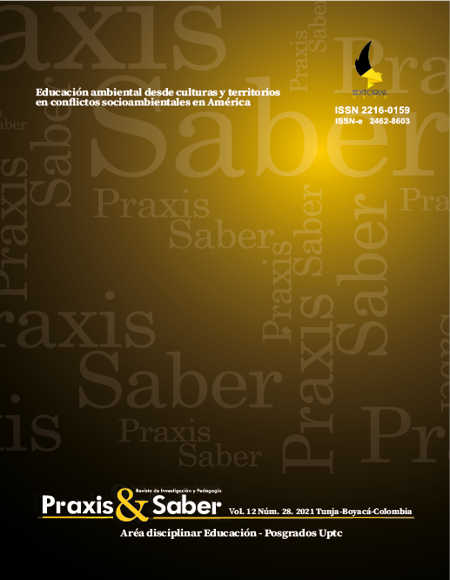“If the river comes to an end, the community comes to an end”: pedagogical dimension of environmental racism

Abstract
This article aims to analyze the educational practices that emerge from conflict situations in which ancestry and the right to the quilombola territory are appreciated. From the narratives of the residents of the Barreiros de Itaguaçu community with regard to the conditions of retrenchment of their traditional territory, we wanted to contribute—through the production of knowledge about the environmental racism experienced by the community—with the hope of increasing its visibility in places where the different axes of
coloniality do not allow it. Living together within the community revealed that the residents create resistance strategies to fight the process of occupation of their territory. This idea of resistance that we describe here is not limited exclusively to the defense of the territory, it also refers to the defense of the ways of survival and to the defense of the community way of life, which evinces the quilombola identity. This context of community resistance is considered as a universe of tensions and diverse problems engendered by the worldwide colonial system, based on the different faces of coloniality, from where the quilombola
community-produced knowledges emerge, which query other ways of appropriating nature.
Keywords
quilombola education, decoloniality, ethnic-racial relations, environmental racism
References
Acselrad, H., Mello, C., & Bezerra, G. (2009). O que é justiça ambiental. Garamond.
Barrozo, L., & Sánchez, C. (2015). Educação Ambiental crítica, interculturalidade e justiça ambiental: Entrelaçando possibilidades. VIII EPEA - Encontro Pesquisa em Educação Ambiental, Rio de Janeiro, Brasil. http://epea.tmp.br/epea2015_anais/pdfs/plenary/139.pdf
Escobar, A. (2014). Sentipensar con la tierra: nuevas lecturas sobre desarrollo, territorio y diferencia. Ediciones Unaula. http://biblioteca.clacso.edu.ar/Colombia/escposunaula/20170802050253/pdf_460.pdf
Escobar, A. (2016). Sentipensar con la Tierra: las luchas territoriales y la dimensión ontológica de las epistemologías del Sur. Revista de Antropología Ibero Americana, 11(1), 11-32. https://doi.org/10.11156/aibr.v11i1.68045
Fals Borda, O. (2015). Una sociología sentipensante para América Latina. Siglo XXI Editores.
Gomes, N. (2017). O Movimento Negro educador: saberes construídos nas lutas por emancipação. Vozes.
Grosfoguel, R. (2018). Para uma visão decolonial da crise civilizatória e dos paradigmas da esquerda ocidentalizada. Em J. Bernardino-Costa, N. Maldonado-Torres, & R. Grosfoguel (Orgs.), Decolonialidade e pensamento afrodiaspórico (1ª ed., pp. 55-77) Autêntica Editora.
Herculano, S. (2006). Lá como cá: conflito, injustiça e racismo ambiental. I Seminário Cearense contra o Racismo Ambiental, Fortaleza, Brasil.
Kassiadou. A. (2018). Educação ambiental crítica e decolonial: reflexões a partir do pensamento decolonial latino-americano. Em A. Kassiadou, C. Sanchez, D. Camargo, M. Stortti, & R. Costa (Orgs), Educação Ambiental Desde El Sur (pp. 25-42). Nupem. https://geasur.files.wordpress.com/2019/03/livro_geasur.pdf
Leff, E. (2016). A Aposta Pela Vida: Imaginação sociológica e imaginários sociais nos territórios ambientais do Sul. Vozes.
Melo, A., & Barzano, M. (2020). Re-existências e Esperanças: Perspectivas decoloniais para se pensar uma Educação Ambiental Quilombola. Ensino, Saúde e Ambiente, (número especial), 147-162. https://doi.org/10.22409/resa2020.v0i0.a40221
Melo, A. (2019). Biodiversidade: narrativas, diálogos e entrelaçamento de saberes da comunidade/escola em um território quilombola do Semiárido Baiano. [Tese, Doutorado em Ensino, Filosofia e Histórias das Ciências, Universidade Federal da Bahia/ Universidade Estadual de Feira de Santana]. Repositório Institucional, UFBA. http://repositorio.ufba.br/ri/handle/ri/29825
Oliveira, L., & Candau, V. (2010). Pedagogia decolonial e educação antirracista e intercultural no Brasil. Educação em Revista, 26(1), 15-40. https://doi.org/10.1590/S0102-46982010000100002
Quijano, A. (2005). Colonialidade do poder, eurocentrismo e América Latina. Em E. Lander (Org.), A colonialidade do saber: eurocentrismo e ciências sociais (1ª ed., pp. 107-126). CLACSO. http://biblioteca.clacso.edu.ar/ar/libros/lander/pt/lander.html
Rangel, T. (2016). Racismo Ambiental às Comunidades Quilombolas. Revista Interdisciplinar de Direitos Humanos, 4(2), 129-141 https://www3.faac.unesp.br/ridh/index.php/ridh/article/view/393
Santos, A. (2019). Colonização e Quilombos: modos e significações (2ª ed.). Instituto Nacional de Ciência e Tecnologia de Inclusão no Ensino Superior e na Pesquisa — INCTI, Universidade de Brasília.
Santos, B., & Meneses, M. (Orgs.). (2010). Epistemologia do Sul. Cortez.
Walsh, C. (2009). Interculturalidade crítica e pedagogia decolonial: in-surgir, re-existir e reviver. Em V. Candau (Org.), Educação intercultural na América Latina: entre concepções, tensões e propostas (pp. 12-43). 7 Letras.
